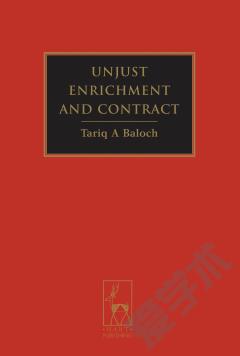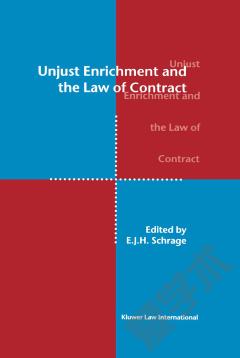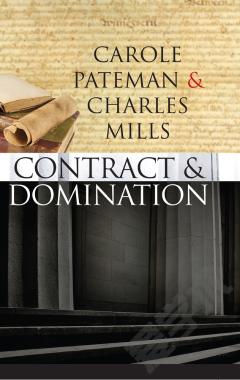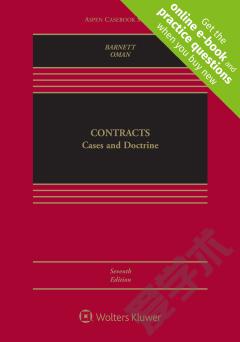Unjust Enrichment and Contract
Introduction 1. An Historical Analysis of the Independence of Unjust Enrichment III. Introduction II. Myth, Mystery and Illusion A. The Two Senses of 'Contract': a Source of Rights and as a Method of Classification B. Procedure and the Development of Indebitatus Claims III. Development of the Law before Moses v Macferlan A. Holt CJ and Indebitatus Claims B. Role of Equity in the Development of the Law C. Encouraging Indebitatus Claims IV. Lord Mansfield's Decision in Moses v Macferlan V. The Period After Moses v Macferlan A. Case Law B. Legal Discourse VI. Learning from the Past: Concluding Comments 2. Rejecting the Role of Unjust Enrichment in the Contractual Context I. Introduction II. A Critical Appraisal of the Three Models A. Kull and the Third Restatement of Restitution B. Hedley C. Jaffey III. Conclusion 3. What is the Best Organisation for the Law of Unjust Enrichment: Unjust Factors or Absence of Basis? I. Introduction II. New Birksian Approach A. Objective and Subjective Tests of 'Basis' B. Notion of Basis C. Greater Unity III. The Pyramid A. Wrong reasons: the Swaps Cases B. Wrong Basis: CTN Cash and Carry v Gallaher C. Clashing Obligations: Roxborough v Rothmans of Pall Mall Australia Ltd D. Enhancing Choice: Deutsche Morgan Grenfell v Inland Revenue Commissioners IV. Three Criticisms of the New Birksian Approach A. By-Benefits B. Negative Formulation C. Retrospectivity of Termination V. Conclusion 4. The Role of Unjust Enrichment in the Contractual Context: an Introduction to Chapters 5 and 6 I. Background II. The Model Proposed in this Book III. Overview of Chapters 5 and 6 5. Historical Foundations of the Modern Law of Unjust Enrichment in the Contractual Context I. Introduction II. Evolution of the Dominant Model A. Background: Independency B. Antecedents of Kingston and Boone C. The Boone Principle in Detail D. Reception of Boone and Establishment of the Dominant Model III. Rescission and Total Failure of Consideration A. Total Failure of Consideration B. Rescission IV. Apportioned Contracts and Quantum Meruit A. Apportioned Contracts B. Quantum Meruit V. Conclusion 6. The True Role of Unjust Enrichment in the Contractual Context I. Introduction II. Core Principles A. Meaning of 'Condition' B. A Qualifying Failure of Condition C. Accrued Rights D. Prevention III. Distinctiveness of Quantum Meruit A. Infringing the Freedom of Choice B. Entire Contracts C. Valuation IV. Unenforceable Contracts and Claims by the Party in Breach. V. Failure of Condition and Absence of Basis VI. Restitution upon Failure of Condition: Contract or Unjust Enrichment? VII. Conclusion Conclusion
{{comment.content}}








 京公网安备 11010802027623号
京公网安备 11010802027623号